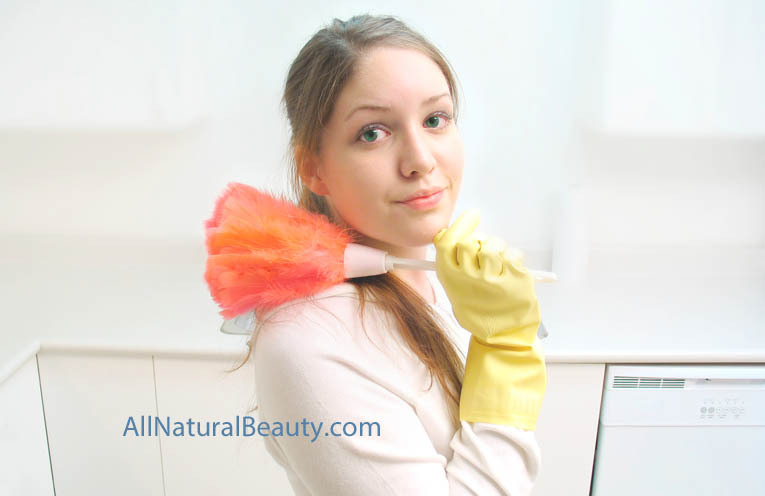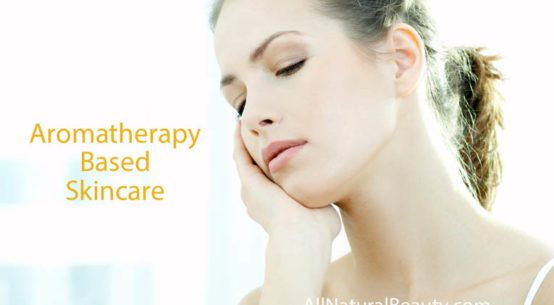
The harsh chemicals that have commonly been used in our cleaning products have recently come under close scrutiny, and for good reason!
There was a time when natural cleaning products were the norm, and it wasn’t that long ago. It was our grandmothers’ generation that had a small selection of household cleaners. Many of them were mixed right in on the same shelves as their cooking ingredients. There’s a simple reason for that. It’s because these were cooking ingredients! These ingredients were used to clean floors and countertops, brighten laundry, remove bad odors, and virtually do every cleaning task in the home. They handled almost every task imaginable effectively, efficiently, and most importantly… safely.
The irony is that these same natural, harmless cooking ingredients are still on our shelves. But through an effective campaign of brainwashing, we’ve been made to think that we need to go out and spend a lot of money on packaged poisons, that are (allegedly) more powerful, tougher, and all around more effective. Are they more effective? Well, think about it, just how much power do you need to remove… dirt? Dirt has been around for centuries, and it’s been cleaned very well by natural methods for the same amount of time.
I won’t even go on to list all of the harmful chemicals that are in these “fancy-new-fangled cleansing products” because I’m sure that you innately know that these are not good for you when you use them. Many people have suffered minor to severe consequences from both the occasional and the consistent use of these products. But hallelujah…
There are natural alternatives!
Vinegar –
This miracle cleaner is a weak form of acetic acid that forms through the fermentation of sugars or starches. It is completely natural and safe. The best form for cleaning is plain white vinegar, and it can be found in most supermarkets. Compared to it’s un-natural counterpart cleaners, you’ll find that it is very inexpensive to buy, and very effective.
Basically, you’ll want to have two spray bottles which you will mark “100% Vinegar” and the other “50% Vinegar / 50% Water”. You’ll use one or the other, determined by the severity of the task at hand. Use it full strength for tough jobs like gooey sticker residue, shower curtain mildew, and toilet bowls. Spray with the 50/50 formulas for countertops, refrigerator cleanup, and almost every kind of surface cleaning.
Vinegar is also a great “odor-remover”. Pour a cup into the sink or garbage disposal, leave for about an hour. Wipe your hands in vinegar after chopping onions or garlic. Leave a bowl of vinegar in a room overnight to remove persistent odors. Clean out pet litter boxes by spraying down and wiping clean.
Vinegar cuts through dirt and chemical residue. Mix 4 parts vinegar with 1 part salt to wipe down soap buildup on faucets. Soap showerheads overnight in straight vinegar to remove the corrosion or chemical buildup. It can also be used on no-wax floors (1 cup vinegar to 1 gallon of water) to bring out a beautiful shine. Use vinegar to clean your wood paneling by using one half of a cup of vinegar, a half cup of olive oil, and 2 cups of warm water. Apply with a soft cloth, and then dry with another clean soft cloth.
Laundry will be cleaner and brighter with the use of vinegar. To make your bright clothes brighter, as well as decrease lint on clothing, add a half cup of vinegar to the rinse cycle. To remove stubborn stains, gently rub with vinegar before washing. To remove soap residue from the washing machine, run an empty (no laundry) cycle with one cup vinegar added. To remove the smell of smoke from clothing, fill a tub with hot water mixed with a cup of vinegar, and hang clothing in the same room overnight. To remove iron scorches from clothes, mix vinegar and salt and gently rub.
Baking Soda –
Baking soda (or bicarbonate of soda, as it is also known) is a naturally occurring material, present in most organic life forms. It can be “made” from sodium carbonate, or soda ash. The soda ash is dissolved in a carbon dioxide rich solution, and sodium bicarbonate (baking soda) precipitates out. You’ll find it in the baking ingredient section of you grocery store at an unbelievably low price.
If you’ve never tried cleaning your oven, bath tub, sink, or countertops with baking soda, you’re going to be amazed at how easily and how well it works! The first time I tried it in the oven, I felt so betrayed by the chemical companies that had made me think that I needed their smelly, eye and skin-burning formulas. Baking soda works much the same way as vinegar does in that it is a wonderful cleaner and odor remover. So you will want to use baking soda for jobs that require more of an abrasive quality.
Use baking soda to freshen up the scent in any room that has carpet by shaking some into the carpet. Let it sit for at least 15 minutes to absorb any odors, and then vacuum it up. Sprinkle some into the bottom of hampers, trash cans, litter boxes, ashtrays, or anywhere else that bad odors reside. And of course we all know about leaving a box of baking soda in the refrigerator to absorb smells. You can do this trick in any cupboard or closet as well.
Again, any time you want to clean up a stain, scorch mark, or chemical residue and want an abrasive quality for extra cleaning power, reach for the box of baking soda. Once you see how well this simple ingredient works, you will want to buy it in the large size. It is a powerful cleansing agent, and truly unrecognized by most for it’s cleaning ability.
Washing Soda –
Washing soda is actually sodium carbonate, and can usually be found in the laundry detergent isle of your supermarket. Arm and Hammer is one company that sells it, but there are others. Even though it is in the same family as baking soda, it is not the same. It is processed differently. Washing soda is much more caustic/alkaline, with a pH of 11, and while it doesn’t give off harmful fumes, you do need to wear gloves. It is a tougher cleaner, capable of breaking down petroleum-based products, waxes, lipstick, etc… So when you want to cut through grease, reach for the washing soda.
Because this product is more caustic in nature, you will want to make sure to use it on surfaces that can withstand it, such as glass and stone. It is strong enough to peel off paint and wax. So don’t use it on wax floors unless you want to remove the wax.
A wonderful laundry detergent that was recommended to me by someone at the “all natural health forum” is equal parts of:
Washing soda
Baking soda
Borax
I’ve been using this formula now for several months and have been extremely pleased. My laundry has remained soft, the colors have remained true, and the best part is that they always come out nice and clean, without the heavy artificial scent which always use to make me sneeze.
All-Natural Scents To Make Your House a Home
Now that you’ve cleaned your house naturally and removed the unwanted odors, you’ll want to replace them with beautiful fresh scents. This can be done quite effectively with essential oils. Essential oils are actual cells from plants, they are not synthetic like those found in your toxic cleansers. Not only do they smell good, they have the actual properties that are found in the plant that they come from. For example, Eucalyptus essential oil (the oil of the leaves of the tree), would have the same properties of the tree that it came from, which is antiseptic, expectorant and antibacterial. Therefore, not only would you get to smell the wonderful robust scent, you would reap the extra cleansing benefits as well.
Other powerful antiseptics would be Tea Tree, Lemon, Oregano, Thyme, Lavender, Lemongrass, Juniper and Rosemary.
But there are other reasons to add scent. One reason of course, would simply be because you enjoy a particular scent. But another reason would be to get properties that would help to change the way you feel. For example, the bedroom would be a good place to use a relaxing scent such as Geranium, Rose, Jasmine, Ylang Ylang, or Lavender. For a kitchen atmosphere you might enjoy some comforting scents such as Cinnamon, Rosemary, Lemon, or Grapefruit. To help your concentration in the office, you may like to use Basil, Rosemary or Lavender. These are just a few examples of the types of properties found in essential oils.
To use essential oils for scenting a room, you can either add them to a diffuser, buy candles that are pre-made with them. Add a drop or two to a light bulb, or spray them in a spritzer bottle mixed with water. Essential oils are extremely concentrated and should be handled with care. Do not let them touch your skin, do not ingest them, and use only a few drops at a time. I would recommend buying a good book on the subject before using them.
Use essential oils while cleaning by adding them to your cleaning products. For example, add a few drops of Lemon, Eucalyptus or Pine essential oil to your spray bottle when spraying the kitchen or bathroom counters and floors with your vinegar spray. Add some lovely fresh scent to your clothing by placing a dampened washcloth, with 10 drops of Bergamot, Lemon or Lavender essential oil on it, into the dryer as your laundry dries. Make a sachet by placing some dried whole herbs in some netting or lace and place them in your closet or drawers. Now you can see that using natural cleaning methods doesn’t mean that you have to forgo beautiful fresh scents.
Be clean, be fresh, be happy… and be well.
Resources:
Vinegar: (Almost) the Only Cleaner You’ll Ever Need – by Noël-Marie Taylor
Cleaning with Baking Soda – by Noël-Marie Taylor
The Wonders of Washing Soda – by Annie Berthold-Bond
House Cleaning with Essential Oils – Aroma-Essence.com
Sharon is an author & licensed esthetician living in Pennsylvania. She has merged her love of natural beauty and wellness into a web enterprise, inspiring others to go the all-natural way whenever possible.
Sharon is an author & licensed esthetician living in Pennsylvania. She has merged her love of natural beauty and wellness into a web enterprise, inspiring others to go the all-natural way whenever possible.














